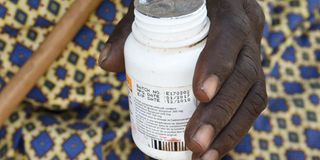Red Cross, Amref war over kitty puts lives at risk

Pills of an antiretroviral (ARV) medicine.
What you need to know:
- The cancellation comes at a time when HIV patients in Kenya have lamented over the stock-outs for Septrin, a broad-spectrum antibiotic that supports their already weak immunity.
Millions of Kenyans are at risk of dying from malaria, HIV and tuberculosis after the Global Fund stopped Kenya from utilising a Sh12.4 billion kitty.
The Fund took the decision after a war erupted between Amref-Kenya and the Kenya Red Cross Society over the management of the donor kitty.
Amref beat World Vision, PS Kenya, Kenya Red Cross and Liverpool VCT Health and was appointed the manager of the fund but Red Cross appealed the decision. The Fund on September 7 wrote to the Kenya judging team, which handled the process, cancelling the awards.
The judging team is an independent team consisting of some 23 member organisations pooled from the United Nations bilateral partners and civil society, called the Kenya Co-ordinating Mechanism.
The members include the World Health Organisation, United Nations Development Programme, United the Nations Population Fund as well as USaid.
The Global Fund then asked the panel, which the Ministry of Health is not part of, to repeat the process and communicate the results by close of business today.
The Fund saud it noted there were flaws in the “financial evaluation part of the procurement process” which should be resolved to ensure “Kenya’s eligibility for the funding request”.
The Red Cross had won the HIV tender since 2012, grants that were always renewed every three years, while Amref had always had the TB tender. Both organisations had scored between A1, the donors’ ranking which is equivalent to scoring between 89 and 100 per cent.
Dr Asha Mohammed of Red Cross said it had come as surprise that the organisation had not performed well enough.
Dr Meshack Ndirangu, Amref Kenya Director, said the organisation had won the award through a public procurement process.
As long as the stalemate stands, the utilisation of the money has been put on hold and this puts the lives of millions on the line.
Some 1.5 million HIV patients require antiretroviral medication and there is no diagnosis and treatment of TB, Kenya’s fifth killer and malaria kills 21,000 people each year, majority of whom are children under five.
The Global Fund money supports other services, such as nutrition and cash transfers for the most vulnerable.
The cancellation comes at a time when HIV patients in Kenya have lamented over the stock-outs for Septrin, a broad-spectrum antibiotic that supports their already weak immunity to fight opportunistic infections such as diarrhoea and Pneumonia.





